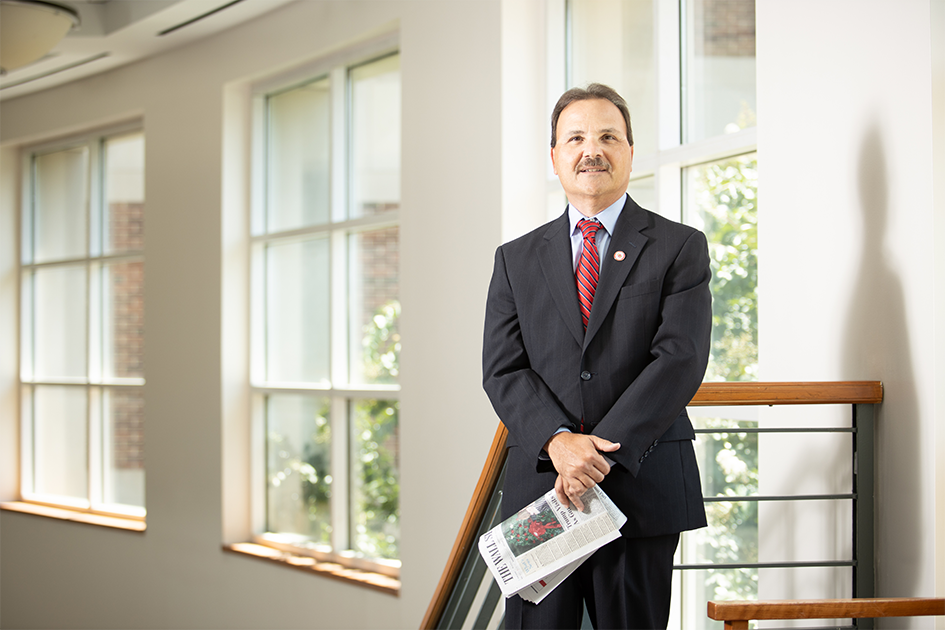
For someone who teaches about taking risks and managing risk, Clifford Rossi, PhD, considers his own career fairly risk-averse.
From the federal government, to government-sponsored enterprises, to financial powerhouses, Rossi’s career went from safe grounds to less career-stable institutions. However, he says, “there is a logical sequence to this career path, now looking back.”
Risk management, he says, is “a bit a finance, economics, statistics, even a bit of accounting. A grab bag of things.” Even though it’s become more of an actuary science in recent years, he believes evaluating risk involves experience, whether from underwriting or from studying the attributes that determine the boundaries of risk, as he did.
However, he calls his career “an accident.” “It found me,” says Rossi, executive-in-residence and professor of the practice at the University of Maryland’s Robert H. Smith School of Business. With undergraduate degrees in economics and international relations, Rossi graduated college in the midst of a recession, and jobs were scarce. After living with his parents back in Colorado while working for a solar heating manufacturing company, he decided to pursue a PhD After completing his master’s and PhD at Cornell University, he headed to Washington, D.C., to work for the government.
It was 1986, and the Savings & Loan Crisis was under way. The Tax Reform Act had just been passed. Rossi was already researching tax analysis for one federal agency and then began investigating how the tax reform would affect banking. Soon other agencies began calling for him, along with the Treasury Department, where he would work in the Office of Domestic Finance and the Office of Thrift Supervision.
He was researching the cost structure of S&L, which got him noticed and recruited by Fannie Mae and, shortly after, Freddie Mac. There, he developed models related to pricing mortgage credit risk. He laughs at the term “big data” because, he says, that’s exactly what he was using to create those models – long before the term was coined.
By 2003, his work had attracted corporate headhunters, and soon he was fully immersed in the high-profile, fast-paced banking world. At the time, Countrywide Bank was the largest financial mortgage originator and he came on as chief risk officer. “It was the place to be,” he says. “It was a humongous jump in my career.” He went from managing 12-15 people at Freddie Mac to 175 people at Countrywide. After a few years there, he was recruited to Washington Mutual in February 2007 as chief credit officer, right before its demise. Seven short months later, he met his own. Apparently, the management didn’t like hearing his perspective that the company had too much credit risk.
It was a huge blow, and he remembered sitting on the ferry in Seattle wondering what to do. Then, his phone rang: Citigroup wanted him to lead its Consumer Lending Group as its chief risk officer out of New York. “Sometimes, at the worst possible moment in your career, the best thing can happen,” he says. It was exciting, high-pressure, with huge responsibility over a global portfolio of home equity, auto loans, student loans and mortgages, right in the middle of the financial crisis. Though it was stressful, “it was the best job I ever had,” he says.
He had been adjunct teaching at Maryland Smith from 1996 to 2003, before he entered banking, and in 2009 he decided to return full-time. He wrote a book for graduate students and practitioners about being an effective risk manager, based on his experiences. He jokes about his career before teaching at Smith. “I started during the S&L crisis and ended during the financial crisis. And I never looked back.”
He likes to advise his students to take risks in school. Try the harder courses, he tells them, because you’ll learn something valuable, even if it brings down your GPA a little. “I wasn’t the best statistician or the best finance guy. My management training was all on the job. What I could do was be a universal translator of all things quantitative. Once you learn that as your differentiator, that becomes something to latch onto.”
–By Rin-rin Yu, special writer to Maryland Smith.
Media Contact
Greg Muraski
Media Relations Manager
301-405-5283
301-892-0973 Mobile
gmuraski@umd.edu
About the University of Maryland's Robert H. Smith School of Business
The Robert H. Smith School of Business is an internationally recognized leader in management education and research. One of 12 colleges and schools at the University of Maryland, College Park, the Smith School offers undergraduate, full-time and flex MBA, executive MBA, online MBA, business master’s, PhD and executive education programs, as well as outreach services to the corporate community. The school offers its degree, custom and certification programs in learning locations in North America and Asia.